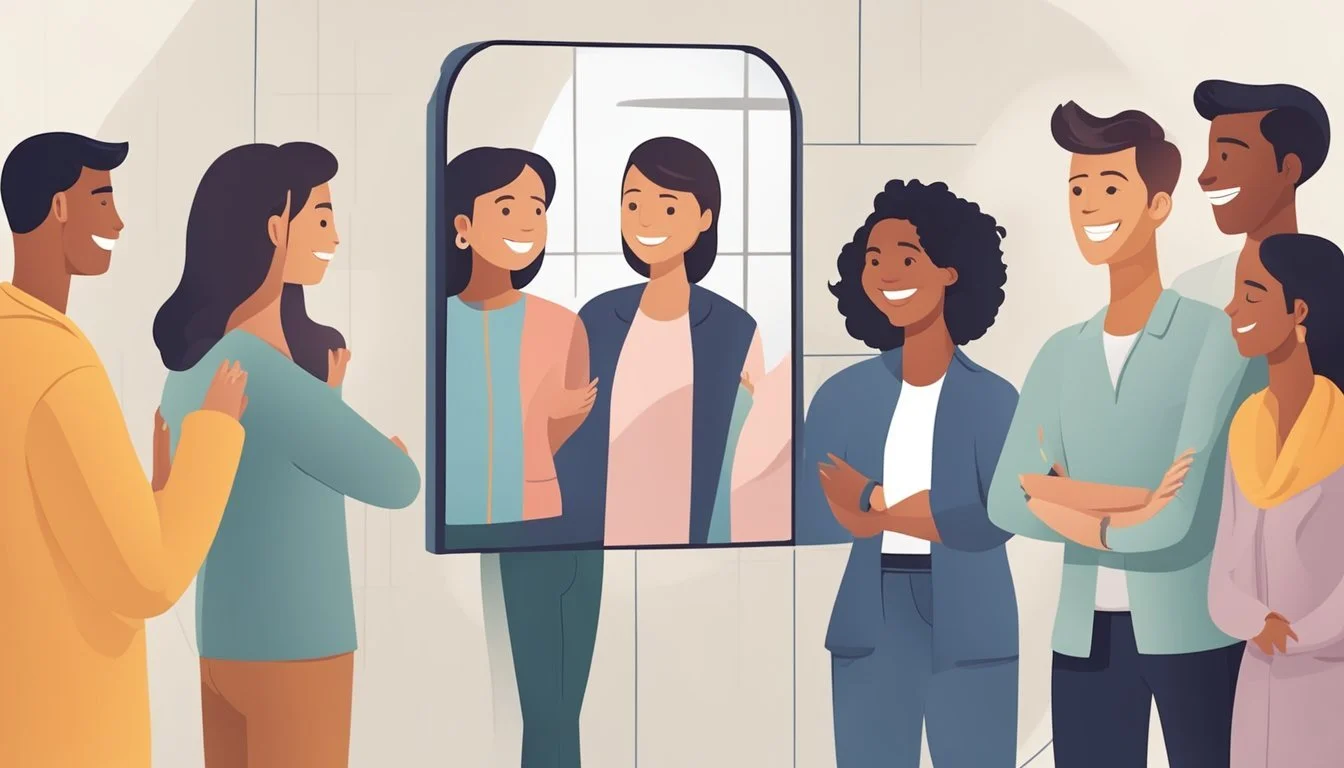Transforming Self-Esteem: Proven Strategies to Boost Your Personal Growth
Self-esteem plays a crucial role in our overall well-being and success. It influences how we perceive ourselves, interact with others, and approach challenges in life. Many people struggle with low self-esteem, but the good news is that it can be improved.
Self-esteem can be enhanced through consistent effort and targeted strategies. Mental health professionals recommend various techniques to boost self-worth and confidence. These include challenging negative self-talk, setting achievable goals, practicing self-compassion, and focusing on personal strengths.
Improving self-esteem is an ongoing process that requires patience and commitment. By implementing proven methods and seeking support when needed, individuals can develop a more positive self-image and increase their overall confidence. This journey of self-improvement can lead to better relationships, increased resilience, and a more fulfilling life.
Understanding Self-Esteem
Self-esteem plays a crucial role in mental health and overall well-being. It influences how individuals perceive themselves and interact with the world around them.
Defining Self-Esteem
Self-esteem refers to a person's overall sense of self-worth and value. It encompasses beliefs about one's abilities, appearance, and place in society. High self-esteem is associated with confidence and a positive self-image, while low self-esteem often leads to self-doubt and negative self-perception.
Self-esteem affects various aspects of life, including relationships, career choices, and personal goals. It shapes how individuals handle challenges and setbacks.
Psychologists consider self-esteem a key component of emotional well-being. It influences motivation, decision-making, and resilience in the face of adversity.
Contributing Factors
Several factors contribute to the development of self-esteem:
Childhood experiences
Parental attitudes and behavior
Academic and social success
Physical appearance
Cultural and societal influences
Trauma, abuse, and discrimination can significantly impact self-esteem. Positive reinforcement and supportive relationships, on the other hand, tend to foster healthy self-esteem.
Genetics may also play a role in predisposing individuals to certain self-esteem levels. However, environmental factors typically have a more substantial influence.
Signs of Low Self-Esteem
Recognizing low self-esteem is crucial for addressing and improving it. Common signs include:
Negative self-talk
Difficulty accepting compliments
Fear of failure or taking risks
Excessive people-pleasing behavior
Trouble setting boundaries
Perfectionism
Individuals with low self-esteem often struggle with assertiveness and may avoid challenging situations. They may also experience physical symptoms like headaches or fatigue.
Low self-esteem can contribute to mental health issues such as anxiety and depression. It may lead to self-destructive behaviors or unhealthy relationships.
Identifying these signs is the first step toward building a healthier self-image and improving overall well-being.
The Impact of Self-Esteem
Self-esteem influences many aspects of a person's life, shaping their mental health, relationships, and professional success. It plays a crucial role in overall well-being and quality of life.
On Mental Health
Self-esteem significantly affects mental health. People with high self-esteem tend to experience lower levels of anxiety and depression. They often have a more positive outlook on life and better coping mechanisms for stress.
Low self-esteem, conversely, can contribute to mental health issues. It may lead to negative self-talk, self-doubt, and feelings of worthlessness. These factors can increase vulnerability to depression and anxiety disorders.
Improving self-esteem can enhance mental well-being. It helps individuals develop resilience and better manage life's challenges. Therapy and self-help techniques can be effective in boosting self-esteem and promoting mental health.
On Relationships
Self-esteem plays a vital role in forming and maintaining healthy relationships. People with high self-esteem often have more satisfying and stable connections with others.
They tend to set appropriate boundaries and communicate their needs effectively. This leads to more balanced and fulfilling relationships, both romantic and platonic.
Low self-esteem can negatively impact relationships. It may cause individuals to:
Seek constant validation from others
Struggle with trust issues
Accept mistreatment or stay in unhealthy relationships
Improving self-esteem can lead to healthier relationship dynamics. It allows individuals to approach interactions with confidence and authenticity.
On Work and Success
Self-esteem significantly influences professional life and success. High self-esteem often correlates with:
Increased job satisfaction
Better performance at work
Greater willingness to take on challenges
People with healthy self-esteem tend to set realistic goals and persist in achieving them. They are more likely to pursue promotions and leadership roles.
Low self-esteem can hinder career progress. It may lead to:
Underperformance due to self-doubt
Reluctance to seek new opportunities
Difficulty in asserting oneself in the workplace
Improving self-esteem can boost professional success. It enhances confidence in one's abilities and fosters a positive attitude towards work challenges.
Building Blocks of Self-Esteem
Self-esteem is built on several key elements that work together to form a solid foundation. These components contribute to a healthy sense of self-worth and confidence.
Positive Self-Talk and Affirmations
Positive self-talk plays a crucial role in shaping self-esteem. It involves consciously replacing negative thoughts with more constructive ones. This practice helps reframe experiences in a more balanced way.
Affirmations are powerful tools for reinforcing positive beliefs about oneself. Regular use of affirmations can gradually shift one's mindset and boost confidence.
Examples of effective affirmations include "I am capable and worthy" and "I deserve respect and happiness." Consistency is key when using affirmations to improve self-regard.
Setting and Respecting Boundaries
Establishing clear personal boundaries is essential for maintaining healthy self-esteem. Boundaries define what behavior is acceptable from others and protect one's emotional well-being.
Learning to say "no" when necessary and communicating limits assertively are important skills. These actions demonstrate self-respect and teach others how to treat you.
Respecting others' boundaries is equally important. It shows maturity and contributes to positive relationships, which in turn support healthy self-esteem.
Developing Competence and Self-Respect
Building competence in various areas of life contributes significantly to self-esteem. Mastering new skills and achieving goals reinforce a sense of capability and worth.
Setting realistic, achievable goals and working steadily towards them helps build confidence. Each success, no matter how small, adds to one's sense of competence.
Self-respect grows as one acts in alignment with personal values and principles. Making choices that reflect integrity and authenticity strengthens self-regard.
Recognizing and appreciating one's strengths is crucial. Focusing on positive qualities and accomplishments helps maintain a balanced self-image.
Practical Strategies for Self-Esteem Enhancement
Improving self-esteem requires commitment and consistent effort. Several effective approaches can help boost one's self-worth and confidence.
The Role of Therapy
Professional therapy provides a supportive environment for addressing self-esteem issues. A therapist can help identify negative thought patterns and develop healthier perspectives. Cognitive-behavioral therapy (CBT) is particularly effective for tackling low self-esteem.
Online therapy platforms have made professional help more accessible. These services offer flexibility and convenience for those seeking support.
Therapists may use various techniques to enhance self-esteem:
Guided self-reflection
Practicing self-compassion
Cognitive Behavioral Approaches
CBT focuses on changing unhelpful thoughts and behaviors. It teaches individuals to recognize and reframe negative self-perceptions.
Key CBT strategies for improving self-esteem include:
Identifying cognitive distortions
Replacing negative self-talk with positive affirmations
Engaging in behavioral experiments to challenge limiting beliefs
Keeping a thought diary to track and analyze thought patterns
These techniques help build a more balanced and accurate self-image. Regular practice can lead to significant improvements in self-esteem over time.
Physical Health and Exercise
Physical well-being plays a crucial role in self-esteem enhancement. Regular exercise releases endorphins, which boost mood and energy levels.
Benefits of exercise for self-esteem:
Increased sense of accomplishment
Better stress management
Enhanced overall health
Incorporating healthy habits into daily routines can also positively impact self-esteem:
Balanced nutrition
Adequate sleep
Stress-reduction techniques like meditation or yoga
Social Connections and Support
Strong social relationships contribute significantly to self-esteem. Positive interactions with others reinforce self-worth and provide emotional support.
Ways to build and maintain supportive relationships:
Join clubs or groups with shared interests
Volunteer in the community
Set boundaries in relationships
It's important to be mindful of social media use. While it can facilitate connections, excessive comparison on these platforms may negatively impact self-esteem.
Building a support network of friends, family, or support groups provides a safe space for sharing experiences and receiving encouragement.
Self-Esteem in Special Contexts
Self-esteem manifests differently across various life stages and cultural settings. It is shaped by unique factors in childhood, evolves during aging, and is influenced by cultural norms and expectations.
Childhood and Adolescence
Children develop self-esteem through interactions with family, peers, and their environment. Positive reinforcement from parents and teachers can foster healthy self-regard. Conversely, bullying or excessive criticism may damage a child's self-image.
Adolescence brings new challenges. Social comparisons intensify, and body image concerns often emerge. Academic performance and extracurricular activities become important sources of self-worth.
Social media adds complexity, creating opportunities for both validation and self-doubt. Teens who receive support and develop coping skills are better equipped to navigate these challenges and build resilient self-esteem.
Aging and Self-Esteem
As people grow older, their self-esteem often shifts. Retirement can impact one's sense of purpose and identity. Physical changes may affect body image and confidence.
However, many older adults report higher self-esteem. Life experience and wisdom contribute to self-acceptance. Strong social connections and continued learning help maintain positive self-regard.
Health issues can pose challenges to self-esteem in later life. Maintaining independence and feeling valued by others become increasingly important. Programs promoting active aging and social engagement can support healthy self-esteem in seniors.
Self-Esteem and Cultural Considerations
Cultural values significantly influence self-esteem development. Collectivist societies may emphasize group harmony over individual achievement. This can affect how self-worth is measured and expressed.
In some cultures, modesty is highly valued, potentially conflicting with Western notions of self-esteem. Gender roles and expectations also vary across cultures, impacting self-perception.
Immigrant experiences can challenge self-esteem as individuals navigate between different cultural norms. Developing a bicultural identity often involves reconciling diverse values and expectations.
Cultural sensitivity is crucial when assessing and addressing self-esteem issues. What appears as low self-esteem in one culture may be a sign of humility in another.
Challenges to Self-Esteem
Self-esteem faces obstacles that can hinder its growth and stability. These challenges stem from external influences, past experiences, and internal struggles.
Dealing with Criticism and Rejection
Criticism and rejection can significantly impact self-esteem. Harsh feedback from others may lead to self-doubt and negative self-perception. Rejection in personal or professional settings can reinforce feelings of inadequacy.
Developing resilience is key to maintaining self-esteem in the face of criticism. Learning to differentiate between constructive feedback and unfair judgment helps individuals respond more effectively.
Practicing self-compassion can cushion the blow of rejection. Remembering that setbacks are a normal part of life allows people to bounce back more quickly.
Overcoming Negative Experiences
Traumatic events and persistent negative experiences can erode self-esteem over time. Childhood adversity, bullying, or abusive relationships often leave lasting scars on one's self-image.
Addressing these experiences through therapy or counseling can be crucial for healing. Cognitive-behavioral techniques help reframe negative thought patterns stemming from past traumas.
Building new, positive experiences can counteract the effects of negative ones. Engaging in activities that promote success and personal growth boosts self-esteem.
Addressing Mental Health Issues
Mental health conditions frequently co-occur with low self-esteem. Depression, anxiety, and eating disorders can both cause and exacerbate negative self-perception.
Seeking professional help is essential when mental health issues impact self-esteem. Treatment may include therapy, medication, or a combination of approaches.
Developing coping strategies for managing symptoms helps individuals maintain a more stable sense of self-worth. Self-care practices and stress management techniques play a vital role in this process.
Recognizing the link between mental health and self-esteem empowers individuals to address both aspects simultaneously, leading to more comprehensive improvements in overall well-being.
Lifestyle Factors Influencing Self-Esteem
Several key lifestyle factors can significantly impact self-esteem. These include dietary choices, physical activity levels, and mindfulness practices. By making positive changes in these areas, individuals can boost their confidence and overall sense of self-worth.
Diet and Nutrition
A balanced diet plays a crucial role in maintaining healthy self-esteem. Nutrient-rich foods support brain function and mood regulation. Eating a variety of fruits, vegetables, whole grains, and lean proteins can improve energy levels and cognitive performance.
Omega-3 fatty acids, found in fish and nuts, may help reduce symptoms of depression. B vitamins, particularly B12 and folate, are essential for producing mood-regulating neurotransmitters. Avoiding excessive sugar and processed foods can prevent energy crashes that may negatively affect self-perception.
Staying hydrated is equally important. Proper hydration supports mental clarity and physical well-being, contributing to a more positive self-image.
Engagement in Physical Activities
Regular exercise has a profound impact on self-esteem. Physical activity releases endorphins, which boost mood and reduce stress. As individuals improve their strength, endurance, and physical abilities, they often experience increased confidence.
Exercise can also improve body image, regardless of changes in appearance. Achieving fitness goals, no matter how small, reinforces a sense of accomplishment. Team sports or group fitness classes can provide social support and a sense of belonging.
Outdoor activities like hiking or cycling expose individuals to nature, which has been shown to reduce anxiety and improve self-esteem. Even brief periods of movement throughout the day can have positive effects on mental well-being.
Mindfulness and Self-Care
Practicing mindfulness can significantly enhance self-esteem. Meditation and deep breathing exercises help individuals become more aware of negative self-talk and develop a more compassionate inner dialogue. Regular mindfulness practice can reduce stress and anxiety, leading to improved self-perception.
Self-care activities, such as getting adequate sleep and maintaining personal hygiene, demonstrate self-respect. Engaging in hobbies or creative pursuits allows for self-expression and personal growth. Volunteering or helping others can boost self-esteem by providing a sense of purpose and social connection.
Cultivating a growth mindset encourages individuals to view challenges as opportunities for learning. This perspective can increase resilience and confidence in one's abilities. Practicing gratitude by regularly acknowledging positive aspects of oneself and one's life can also contribute to higher self-esteem.
Continual Growth and Self-Esteem
Self-esteem is closely linked to personal growth and development. Cultivating a growth mindset, engaging in lifelong learning, and recognizing achievements all contribute to building and maintaining healthy self-esteem.
Creating a Growth Mindset
A growth mindset is the belief that abilities and intelligence can be developed through effort and practice. This perspective fosters resilience and encourages individuals to embrace challenges as opportunities for improvement.
People with a growth mindset view setbacks as learning experiences rather than personal failures. They focus on the process of growth rather than fixed outcomes.
Developing a growth mindset involves:
Embracing challenges
Viewing effort as a path to mastery
Learning from criticism
Finding inspiration in others' success
By adopting these attitudes, individuals can enhance their self-concept and build a stronger sense of self-worth.
Lifelong Learning and Self-Esteem
Continuous learning plays a crucial role in maintaining and improving self-esteem. Acquiring new knowledge and skills boosts confidence and reinforces a positive self-image.
Engaging in lifelong learning:
Expands one's capabilities
Increases adaptability to change
Promotes cognitive flexibility
Enhances problem-solving skills
Fosters personal growth
Learning can take many forms, from formal education to self-directed study or hands-on experiences. The key is to remain curious and open to new information and perspectives.
Regular learning experiences provide opportunities for self-reflection and personal development, contributing to a more robust and resilient self-esteem.
Celebrating Personal Achievements
Recognizing and celebrating personal accomplishments, both big and small, is vital for nurturing self-esteem. Acknowledging progress reinforces a positive self-concept and motivates further growth.
Effective ways to celebrate achievements include:
Keeping a success journal
Sharing accomplishments with supportive friends or family
Rewarding oneself for meeting goals
Reflecting on the effort and growth involved in each success
It's important to celebrate effort and progress, not just end results. This approach aligns with a growth mindset and reinforces the value of persistence and hard work.
By regularly acknowledging personal achievements, individuals can build a stronger sense of self-worth and maintain motivation for continued growth and learning.
Conclusion
Self-esteem can indeed be improved through deliberate effort and practice. By cultivating a positive mindset and challenging negative self-talk, individuals can boost their confidence and overall well-being.
Surrounding oneself with supportive people and engaging in activities that promote personal growth contribute to enhanced self-esteem. Seeking professional help when needed can also be beneficial.
Developing healthy self-esteem is a journey that requires patience and persistence. It involves accepting oneself while acknowledging areas for improvement. With consistent effort, individuals can build a stronger sense of self-worth.
Improved self-esteem positively impacts various aspects of life, including mental health, relationships, and personal achievements. It enables people to face challenges with greater resilience and pursue their goals more confidently.
Remember that self-esteem is not about perfection but about recognizing one's inherent value. By embracing this perspective, individuals can foster a healthier relationship with themselves and the world around them.



